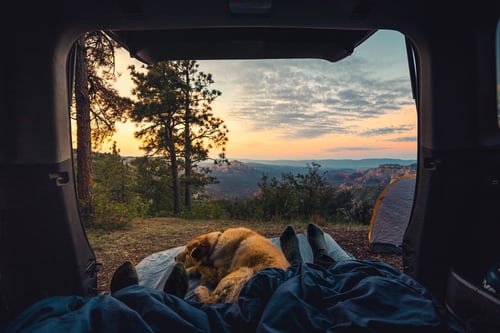Camping can be an amazing experience. It can help you connect with nature and allow you to explore all of the amazing sides of the great outdoors. However, if you’ve never been camping before and you embark on this adventure unprepared, you might not have such a good time. In fact, you can even put yourself in danger. In case you want to go camping and you want to do it properly, here are some tips to make this one of the most enjoyable and fulfilling trips you’ve ever been on.
Pick the Right Camping Spot

If you’ve heard a bunch of stories of how your friends love camping in the wild and how incredible that can feel, you might become tempted to do the same. Before you do so, do some thinking and thorough research. Being that this is the first or second time you go camping, remember that it’s always better to be safe than sorry. Look for a campsite where you’ll have functioning toilets and showers, and possibly with a town or at least a village nearby, so that you can get the necessary supplies, in case you forget to bring something. If you’re still interested in camping in the wild, research the surrounding grounds, so that you know where to set your tent, where you can find fresh water or if there are any animals or other types of danger that you need to worry about.
Practice at Home

You’ve seen other people set up a tent and it looks like a fairly easy thing to do, so you don’t feel you have to worry about doing it yourself once you reach your campsite, right? Well, not really. It’s crucial that you put up your tent once before you leave home, so that you know how it’s done and whether you can even do it yourself. Similarly, make sure your torches or lanterns work or if your stove functions. Doing things like these in advance can save you from a lot of trouble while camping, as one of the worst situations that you can find yourself in is to spend your first night without lights or a tent, or that you want to cook a meal and then realize that your stove doesn’t even work. Read all of the instruction manuals at home and perhaps even copy the important ones, so that you have something to fall back on if anything happens to the original. Your trip will be much more enjoyable if you go fully prepared, so that you don’t have to waste your time or your nerves on things you could have already mastered at home.
Don’t Buy Everything

Camping might seem inviting and fun when you imagine it in the comfort of your home, but you won’t be sure until you’ve tried it. This is why spending ridiculous amounts of money on brand new equipment may not be the best idea, as you could decide that you don’t like it after all and that you don’t want to do it ever again. So, perhaps you could rent some things, especially the bigger pieces, such as a tent, a backpacking stove or even sleeping bags. Also, the little, not so expensive pieces of equipment you think are extremely cool could end up being completely redundant, so refrain from buying such things. On the other hand, there are some items that you’ll definitely need on your camping trip and that you should purchase freely. For example, top-quality automatic knives will certainly come in handy and you can use one for cutting things around your camping spot or even as a self-defense knife, in case of an animal attack or similar threats. Such tools are a smart investment, as they’re useful in a whole range of situations, not just when you’re camping. Also, they’re small enough and easy to carry, meaning that they won’t take too much of your precious space. Once you go through your first camping vacation, you’ll have more insight into what you actually need to buy and what you can do without next time you go.
Choose Appropriate Food

Fresh and perishable food isn’t something that will last long inside a tent, unless you’re bringing a cooler. But even so, keep in mind you’re in nature and that you’ll want things that can last longer, that are easy to serve and, above all, simple to prepare. Food you bring should be in packages that aren’t complicated to store, it should be durable and, most importantly, nutritious. If possible, get food items that you can keep at a room temperature, so that they don’t go bad if it gets warmer during the day. Canned food is a good choice, but also certain fresh foods, like potatoes, carrots or onions, as well as such snacks as nuts or granola bars. While it’s not impossible to cook some more elaborate meals while camping, know that it takes some practice, which is something that you probably haven’t had yet. Best you can do is plan for delicious meals that are quick and easy to make. Finally, if you have a long way to walk from the spot where you leave your car to the spot where you’ll set up your tent, opt for as much lightweight food as you can, so that carrying it doesn’t become an issue.
Although there are many aspects of camping to consider before you head off, these are the essential ones, and a good starting point. If you need more information, it would be great if you can talk to one of your friends or acquaintances who have already been camping more than once and see what type of advice they have for you.